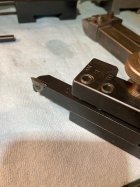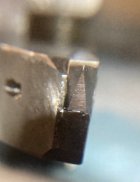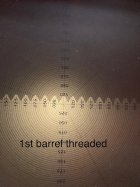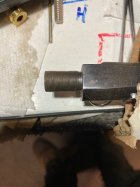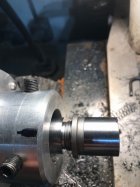If a person wanted to purchase a lathe and learn the craft of doing your own barrel etc...what would you suggest?
I have a small amount of knowledge on using a lathe.
No intention of doing this as a business, just for my son and I.
He is into restorations and has need of lathe work from time to time.
I want to learn to do my own barrels.
Call it my upcoming retirement adventure into my 3rd or 4th childhood...least according my bride.
I know many say they have done so with something like a 10x20, 10x24 lathe etc
In my personal opinion
I would not want to struggle, figure out how to make work anything smaller than a 12x36
When I first became a machinist many years ago and later went on to become head machinist of a small company of 120 employess
I had a 12x36 Jet and a Bridgeport Mill, among other various little cool machines. like an Orbital Welder
I learned on a Jet that had some play and some slop,, but a guy can get used to the slack and take up in the screws.
I still was able to hold .001" tol. because I got to know the lathe well
machining on it 40 hrs a day for years
I kept requesting a new lathe from Upper Mngt.
it never got approved because I kept holding the Engineers requested tolerances
on everything from SS to Teflon.
---
Now I use a 13x40
That to me is the perfect home hobbyist size lathe
BTW the bigger the lathe the larger the through hole on the Spindle - 1.5" min needed.
My Lathe uses beefier BXA size holders vs slightly smaller AXA size of a 12x36
I have used slightly larger lathes such as 16x42 lathe and can say the bigger the lathe
Does not hamper or hurt at ALL even though it may appear intimidating by looks
A larger lathe only serves to provide more rigidity in your work
----
What you want for gunsmith quality is
---
1) no wear or saddleback in the bed ways, flat all the way lengthwise
2) no play in the Headstock bearings
---If there is ANY play, it will show up in your work and in your finish
With my current 13x40 I can sneak up in .0001" increments with no deviation in the surface finish because the headstock bearings are that tight (no play)
Such as if you wish to re-profile your barrel, you want it done right the first time rather than having to touch up, sand, grind, smooth the finish to cover up shoddy work.
It depends on how intricate, and fine, and totes awesome bad ass you wanna be with your work
Turning and facing and crowning etc, well...
Lets just say, you CAN use a worn out lathe
But you WANT a lathe thats tight, straight, flat, etc
3) you want your tailstock to be able to get damn close to be in alignment of your headstock centerline
Like within .003" (Learn how to check this.)
You got a lot of learning ahead of you, but it aint rocket science its more math, trig, and geometry.
and whole buttload of common sense.
---
Other than that, you will get all sorts of other recommendations that may or may not mean much
Such as Gear head vs belt driven etc. (who cares)
---
I will also say, I like the D1-4 type attachent for the chuck vs a screw on chuck
I have another 12x36 that uses a screw on chuck
that if you operate in reverse (And you will)
the chuck sometimes can unscrew, (NOT FUN)
the camlock D1-4 (or D1-5 etc) I believe is a more solid lock up and CANNOT come loose
(If you tightened it down correctly)
---
One thing about having as much bedway length as possible is if you ever turn between centers
(And you will)
you WILL WANT and WILL USE - all that room
you may not need
but you will WANT - all that room
Theres nothing worse than you want a new 28 inch krieger but the its 6 months wait
but hey Brunos has a 34 inch in stock right now!!!!
But guess what? You cannot turn it because you settled for a 10x24
---
Be sure your lathe comes with a 4 jaw chuck, pay for a good one
dont even think about doing quality work with a 3 jaw
if a guy does not know how to use and setup in a 4 jaw, I would not pay him $100 to do anything
if you have to ask why? I'd suggest you instead get a book and do some homework
---
Make sure you get a Steady rest, (A follow rest is not the same and will collect dust)
---
Aloris(Dorian) vs China tool holders
there is a reason Aloris cost more
Aloris = no flex in the holder = the holders are so hard you cannot scratch them with a file
The china copies can easily be scratched with a file
Sometimes you want that extra rigidity, such as for boring, so get a few Aloris holders
for other operations the china/Ebay toolholders are fine, you will learn which is what and when
---
The tooling, indicators, mag base holders etc will cost you as much as the lathe,
so if you buy used, hopefully your lathe comes with
a Quickchange wedge type toolpost and some nice tool holders
---
learn how to set up your lathe on a solid foundation (Concrete) and level it in all 3 directions
learn how to make a test cut to ensure this
---
When you get more serious
(And you will)
You will wish you held out and spent more money on quality,
vs just getting a good deal for now
I once came across a 12x36 lathe on CL for $1000
I thought for $1k why not
the guy asked what I was gonna use the lathe for
I answered for working on my own guns
He upfront stated -"you would not want to use this lathe for guns, its pretty worn"
dont be in a hurry and settle for less just like getting married, it will bite you.
get what you really "NEED" to actually be happy with and be proud of your work
doing shoddy work, is nothing to brag about at the range
Soooo many people want to puff their chest out and be able to say
"I did it MYSELF!!"
Well, guess what, people are going to judge your work byy it's look and its finish
and if it doesnt look good, you will not want to say "I did it my SELF!!!"

---
Lastly, many lathes you cannot find parts for, be sure your lathe is complete, doesnt need any gears etc to work right
cuz some dude will sell you a POS for cheap that you think is a good deal that you can never use for anything just to get it out of his garage for scrap price and you did the hauling for him.
---
Lastly - you DO NOT NEED 3 Phase (220v single phase dryer outlet will do everything you need)
---
A newer less worn out Jet, is better than an old worn out Leblonde, lodge and shipley, Southbend etc.
If you find, and they are out there, a Hardinge 12x36 or bigger, GET IT
be sure it has a tailstock
I ran a couple Hardgine lathes and they are smoooooth and very well thought out lathes
---
I don't mean to sound shall I say "Elitist" but you want to give yourself room to grow
don't limit yourself or the operations you will want to be able to perform later
Listen to whatever
Jackie Schmidt, Butch Lambert, Dave Tooley offer to tell you. (theres a few others here too
but those 3 have tons of experience in this game.)










